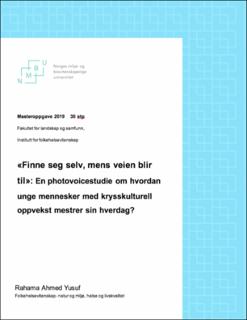| dc.contributor.advisor | Raanaas, Ruth Kjærsti | |
| dc.contributor.author | Yusuf, Rahama Ahmed | |
| dc.coverage.spatial | Norway | en_US |
| dc.date.accessioned | 2020-03-19T11:01:41Z | |
| dc.date.available | 2020-03-19T11:01:41Z | |
| dc.date.issued | 2019 | |
| dc.identifier.uri | https://hdl.handle.net/11250/2647539 | |
| dc.description.abstract | Bakgrunn: Økende andel barn og unge i Norge vokser opp med røtter i flere kulturer, hvor omtrent 4 av 10 har krysskulturell bakgrunn. Det å ha krysskulturell oppvekst kan være utfordrende i en viktig overgangsfase i livet fra ungdom til ung voksen, der de skal utvikle seg og definere sin egen identitet og finne sin plass i samfunnet. Det er begrenset kunnskap om hvordan de unge med krysskulturell oppvekst opplever mestring i hverdagen, bevarer god helse i norsk og vestlig kontekst. Det er derfor behov for ressursorientert kunnskap om krysskulturelle ungdommer og unge mennesker som vokser opp med røtter i flere kulturer for å få en større forståelse for deres erfaringer av hva som bidrar til mestring og styrket helse.
Hensikt: Målet med denne undersøkelsen er å utforske og forstå hvilke faktorer unge mennesker med krysskulturell oppvekt erfarer at er av betydning for å mestre sin hverdag.
Metode: Studien har en kvalitativ forskningsmetode og datagrunnlag baserer seg på photovoice. Metoden er brukt til å innhente datamaterialet gjennom aktiv deltakelse av informantene, med utgangspunkt i fotografier tatt av ungdommene som ble vist og diskutert i fokusgruppe, og to semistrukturerte individuelle intervjuer. Alle informantene ble rekruttert på bakgrunn av deres krysskulturelle bakgrunn. Utvalget besto av åtte krysskulturelle ungdommer med to til fire kulturelle bakgrunn, i alderen 16-19 år, fra Oslo, deriblant 4 jenter og 4 gutter. Analysen av fokusgruppen og intervjuene ble utført gjennom tematisk innholdsanalyse.
Hovedfunn: Gjennom analysen ble det identifisert sju hovedkategorier: «leve ut ambisjoner», «ta vare på egen helse», «å ha venner», «å gi noe tilbake», «å ha noen som tror på deg», «å utfolde seg fysisk» og «å praktisere tro» som illustrerer faktorer som er av betydning for å mestre hverdagen for informantene, og samtidig spilte en viktig rolle i overgangsfasen i livet, som de unge var i. Disse faktorene må sees i lys av konteksten de befant seg i. Selv om mange av faktorene bidrar til mestring, var det også tydelig at disse unge menneskene opplevelsen press og krav i hverdagen. Funnene i denne studien ble diskutert i lys av ressursorienterte tilnærminger som salutogenese, og hvordan mening og mestring skapes gjennom aktivitet og deltagelse. | en_US |
| dc.description.abstract | Background: An increasing number of children and adolescents in Norway grow up with roots in several cultures, with about 4 out of 10 having a cross-cultural background. Having cross- cultural upbringing can be challenging in the important life transition from adolescence to young adult, where the young ones must develop and define their own identity and find their place in society. There is limited knowledge of how young people with cross-cultural upbringing experience mastery in everyday life, maintain good health in the Norwegian and Western context. A strength-based knowledge of adolescents and youth who grow up with cross-cultural background is therefore needed to gain a greater understanding of their own experiences with factors that promotes mastery and good health.
Purpose: The aim of this study is to explore and understand what factors young people with cross-cultural upbringing identify that are of importance for mastering their everyday lives.
Method: The study has a qualitative research method and data base is based on photovoice. The method was used to obtain the data material through active participation of the informants, based on photos taken by the adolescents that were displayed and discussed in the focus group, and two semi-structured individual interviews. All informants were recruited based on their cross-cultural background. The sample consisted of eight cross-cultural adolescents with two to four cultural backgrounds, aged 16-19, from Oslo, including 4 girls and 4 boys. Data analysis of the focus group and the interviews was done according to thematic content analysis.
Findings: Through the analysis, seven main categories were identified: "living out ambitions", "taking care of your own health", "having friends", "giving something back", "having someone who believes in you", "unfolding themselves physically ”and“ practicing faith ”which illustrate factors that are important for mastering everyday life for informants, while at the same time the factors played an important role in the life transition in which the young people were. These factors must be seen in light of the context they were in, although many of the factors contribute to mastery, it was also clear that these young people experience pressures and demands in everyday life. The findings were discussed in the light of strength-based approaches like salutogenesis and how meaning and mastery are created through participation and engagement. | en_US |
| dc.language.iso | nob | en_US |
| dc.publisher | Norwegian University of Life Sciences, Ås | en_US |
| dc.rights | Attribution-NonCommercial-NoDerivatives 4.0 Internasjonal | * |
| dc.rights.uri | http://creativecommons.org/licenses/by-nc-nd/4.0/deed.no | * |
| dc.subject | Cross-cultural background | en_US |
| dc.subject | Public health | en_US |
| dc.subject | Photovoice | en_US |
| dc.title | «Finne seg selv, mens veien blir til» : en photovoicestudie om hvordan unge mennesker med krysskulturell oppvekst mestrer sin hverdag | en_US |
| dc.type | Master thesis | en_US |
| dc.description.version | updatedVersion | en_US |
| dc.description.localcode | M-FOL | en_US |

